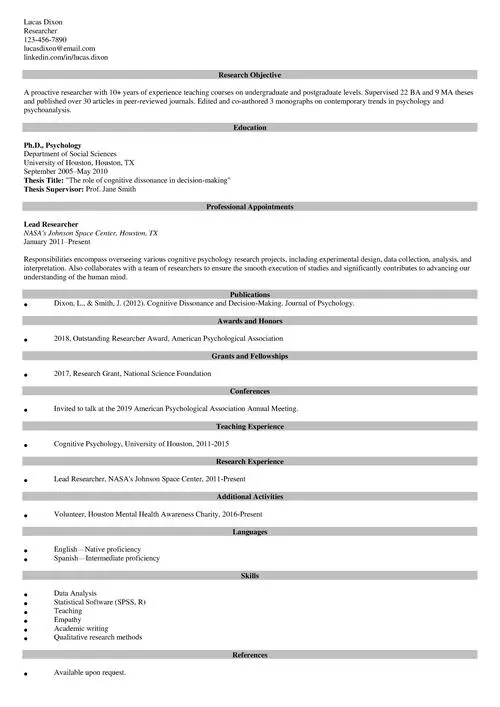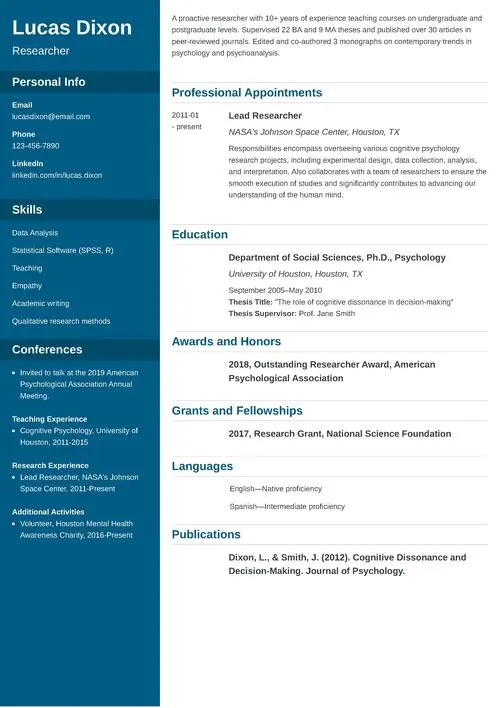What Is a CV? Meaning of Curriculum Vitae + Template
Create your CV nowWhat’s a CV? What does a CV stand for? It’s a real problem for job applicants. But don’t fret. There’s a simple CV definition. And in this article, it comes with a great example and a brief how-to guide. Just scroll down to find your answers.
This guide will show you:
- What is a CV in Europe and America.
- What does CV mean for & where to use it.
- Why curriculum vitae meaning differs by location.
- How to write either kind of CV.
Want to save time and have your resume ready in 5 minutes? Try our resume builder. It’s fast and easy to use. Plus, you’ll get ready-made content to add with one click. See 20+ resume templates and create your resume here.
Sample resume made with our builder—See more resume examples here.
Looking for some more expert knowledge? Read our other informative guides:
- What Is a Cover Letter for a Resume?
- Cover Letter Perfect Length
- What Does a Cover Letter Look Like?
- What Is a Short Cover Letter?
- What Is a Letter of Intent?
- What Is a Recommendation Letter?
What Is a CV—Definition
Let’s start with a simple answer to a simple question: what is a CV? It stands for Curriculum Vitae or “course of life.” But let’s dig a bit deeper.
Curriculum Vitae, more commonly known as a CV, is a document that lists details regarding your education, accomplishments, publications, conferences, grants, fellowships, languages, skills, and additional relevant activities. It summarizes your entire career but focuses only on the academic side.
It sounds very close to what a resume is, right? A resume is a formal document illustrating your career background, education, and skills. So what is the difference between a CV and a resume? It depends—because the meaning and definition of a CV depend on your location.
To ace a CV, you must not only understand what it is, but how to structure it. Read our guide: Curriculum Vitae Format
CV Meaning(s): America vs Rest of the World
Let’s take a look at what a CV means in the USA and everywhere else.
In the United States, the definition of a CV is a document that often refers to a scholarly resume. It's an exhaustively comprehensive rundown of your entire academic career and therefore has no limited length. Unlike traditional resumes, it can add up to many pages, similar to a federal resume or an academic CV.
In Europe, however, a CV is a resume for a job. It has a standard resume length. Instead, it touts accomplishments that prove key skills needed for the job. It’s similar to American resumes, aiming to convince the reader to invite you for a job interview.
So, let’s see a professional example of a CV.
Pro Tip: What is a Curriculum Vitae? CV stands for those two Latin words. It’s an acronym for “Course of” and “Life.” Your resume is the course of your life in short.
CV Example
Lucas Dixon
Researcher
123-456-7890
lucasdixon@email.com
linkedin.com/in/lucas.dixon
Research Objective
A proactive researcher with 10+ years of experience teaching courses on undergraduate and postgraduate levels. Supervised 22 BA and 9 MA theses and published over 30 articles in peer-reviewed journals. Edited and co-authored 3 monographs on contemporary trends in psychology and psychoanalysis.
Education
Ph.D., Psychology
Department of Social Sciences
University of Houston, Houston, TX
September 2005–May 2010
Thesis Title: "The role of cognitive dissonance in decision-making"
Thesis Supervisor: Prof. Jane Smith
Professional Appointments
Lead Researcher
NASA's Johnson Space Center, Houston, TX
January 2011–Present
Responsibilities encompass overseeing various cognitive psychology research projects, including experimental design, data collection, analysis, and interpretation. Also collaborates with a team of researchers to ensure the smooth execution of studies and significantly contributes to advancing our understanding of the human mind.
Publications
- Dixon, L., & Smith, J. (2012). Cognitive Dissonance and Decision-Making. Journal of Psychology.
Awards and Honors
- 2018, Outstanding Researcher Award, American Psychological Association
Grants and Fellowships
- 2017, Research Grant, National Science Foundation
Conferences
- Invited to talk at the 2019 American Psychological Association Annual Meeting.
Teaching Experience
- Cognitive Psychology, University of Houston, 2011-2015
Research Experience
- Lead Researcher, NASA's Johnson Space Center, 2011-Present
Additional Activities
- Volunteer, Houston Mental Health Awareness Charity, 2016-Present
Languages
- English—Native proficiency
- Spanish—Intermediate proficiency
Skills
- Data Analysis
- Statistical Software (SPSS, R)
- Teaching
- Empathy
- Academic writing
- Qualitative research methods
References
- Available upon request.
Now that you’ve seen a CV, let’s find out who can benefit from using one.
Making a resume with our builder is incredibly simple. Follow our step-by-step guide, use ready-made content tailored to your job and have a resume ready in minutes.
When you’re done, Zety’s resume builder will score your resume and our resume checker will tell you exactly how to make it better.
What Is a CV’s Purpose, or Who Is it Good for?
Once again, it depends.
In Europe, a CV is good for anybody looking for a job. It has the same purpose as a resume. Moreover, the term resume is not as popular as in the United States. Just like a CV is not as popular here. And if you’re wondering what is a CV for a job, it’s the same as a resume. Just not in America.
In the U.S., a CV is mainly used in academia, medicine, and law. In other words: where research, publications, presentations, conferences, and fellowships matter most. If you’re looking for a job outside of these areas, you’ll most likely have to write a resume for a job.
Additionally, researchers outside of academic settings or established lawyers in the mid-to-late stages of their careers may also find a CV beneficial, as it follows a different format than a resume. A CV length fully depends on you, so it can be way longer than a resume, highlighting tons of relevant and impressive information.
Now that you know the difference, let’s see how to write a CV if you’re in America.
Pro Tip: Some academic facilities provide guidance on how to format a CV, what to include in it, and how to submit it. Look for them as well as for academic CV examples on facilities’ websites.
What Is a CV Made of? Brief How-to Guide
You need to divide your document into different CV sections. But apart from that, you must also mind some formatting tips.
Here’s how to ace it:
- Make your CV stand out. Distinguishing yourself from other competitors is always a must. Search for some CV design ideas to get inspired.
- Mind the correct margins and line spacing. Giving some white space between impressive entries will only boost the readability of your document.
- Find an appropriate font. Choosing a classic is always a good idea, but there are more good fonts than just Times New Roman or Arial.
- Select the right CV format that meets your needs. You can choose from a: reverse chronological CV, a skills-based CV, or a combination CV.
- Open with a header with your personal information and contact details.
- Write a CV summary. It’s just like a resume summary, a short paragraph at the top of your CV that summarizes your key achievements.
- Create a strong experience section using bullet points and action verbs to boost the readability of your document.
- Add extra sections such as:
- Certificates and Licenses
- Conferences you Attended
- Conferences you Presented at
- Honors and Awards
- Grants and Fellowships
- Relevant Publications
- Memberships and Affiliations
- Language Skills
- Key Skills
- List your references or consider adding a sentence stating that the references are available upon request.
Now that you know not only what it is, but also how to write a CV, let’s briefly summarize what we’ve learned here today.
Pro Tip: There are some free Word CV templates available online, but they might fail to pass the ATS scan of your document. Choosing a CV template provided by a professional resume/CV/cover letter builder is always a better idea.
Plus, a great cover letter that matches your resume will give you an advantage over other candidates. You can write it in our cover letter builder here. Here's what it may look like:
See more cover letter templates and start writing.
Key Takeaway
Let’s do a quick recap to better understand what is a CV:
- In Europe CV meaning is the same as a US job resume. We just call them different names.
- In the US, a CV is an exhaustive academic resume, usually longer than two pages.
- Use an academic CV in the US for master’s or doctoral programs. Don’t tailor it to any job or position.
- Customize a CV for a job in Europe or New Zealand just as you would customize a US resume.
And that’s it! Whether you’re writing a European CV or an American one, I wish you good luck!
Do you have questions about when to use a CV or when to use a resume? Give us a shout in the comments. We’d be happy to reply!
About Zety’s Editorial Process
This article has been reviewed by our editorial team to make sure it follows Zety's editorial guidelines. We’re committed to sharing our expertise and giving you trustworthy career advice tailored to your needs. High-quality content is what brings over 40 million readers to our site every year. But we don't stop there. Our team conducts original research to understand the job market better, and we pride ourselves on being quoted by top universities and prime media outlets from around the world.




